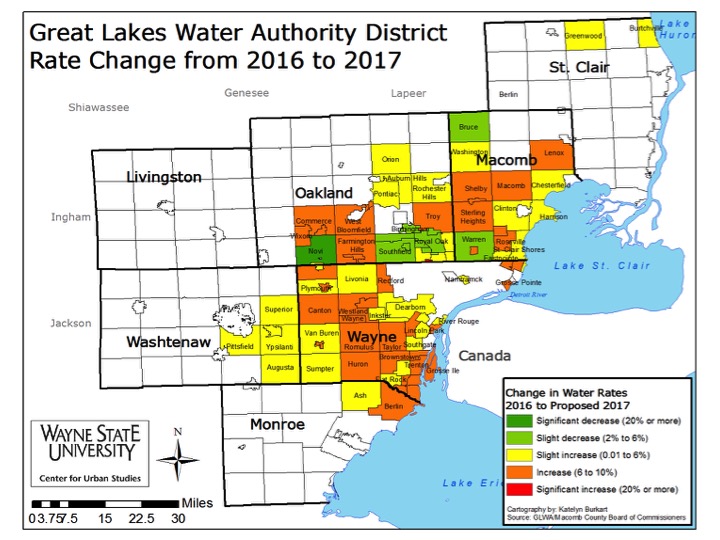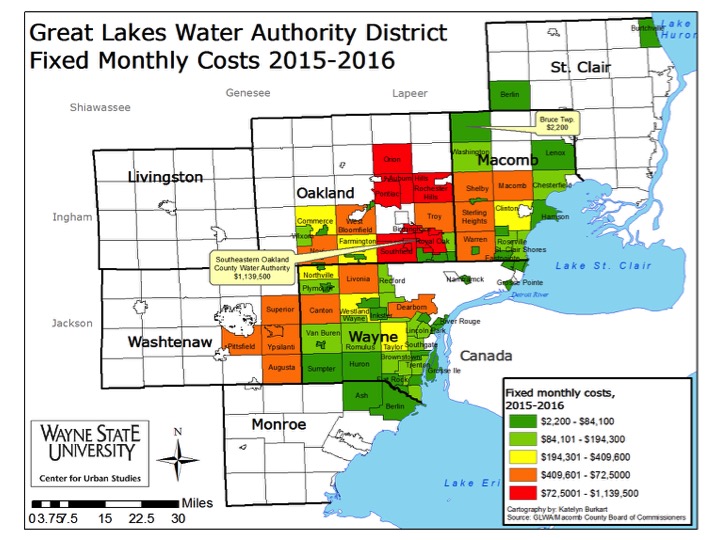With the proposed wholesale water rate changes for the newly formed Great Lakes Water Authority (GLWA)-which now provides water and sewer services to 127 former Detroit Water and Sewer Department (DWSD) customers-only one of the 89 tri-county customers is expected to experience a rate decrease above 10 percent. That community is the city of Novi and the anticipated decrease between 2016 and 2017 is 23.7 percent. The only other government entities expected to experience a decrease are Bruce Township, the city of Warren and the Southern Oakland County Water Authority (which is made up of Royal Oak, Berkley, Clawson, Huntington Woods, Pleasant Ridge, Southfield, Beverly Hills, Lathrup Village, and Bingham Farms). The reason for Novi’s expected wholesale water rate decrease is because of a water reservoir that went online in the city in July of 2015. This reservoir allows the city to hold up to 1.5 million gallons of water; it is filled nightly when demand and costs are lower and discharged at peak hours during the day, according to the Hometown Life article.
While wholesale rate decreases are expected to occur for a select few communities, wholesale rate increases are anticipated to be the norm for the region. The overall average wholesale rate increase for the region is expected to be about 6.1 percent, but Royal Oak Township’s expected increase is estimated to be about 20 percent. New Haven and Romeo were the only other two government entities in the GLWA that are expected to experience a wholesale water rate increase above 10 percent. New Haven is expected to experience an increase of about 14 percent, and Romeo is expected to have an increase of about 12 percent.
Charges for water service are a combination of a monthly fixed cost (which are associated with infrastructure costs) and metered usage. According to an interview the Detroit News held with the GLWA, monthly fixed costs make up about 60 percent of what the GLWA charges a community, and the remainder is metered usage. At the time of this post it is unclear why fixed costs vary so vastly from one government entity to another. However, this is a question Drawing Detroit will be further investigating.
While both Novi and Bruce Township are expected to have wholesale rate decreases, they are two of 22 communities in the GLWA that had 2016 commodity costs above $10 per million cubic feet (mcf). Bruce Township had the highest commodity price per mcf of all the GLWA customers at $22.82 per mcf. Additionally, the township’s fixed wholesale monthly cost was $2,200 in 2016. In 2017 that fixed monthly cost is expected to increase to $2,300, and the commodity price is expected to be $21.44 per mcf. This represents a 6 percent wholesale rate decrease. For Novi, the 2016 cost per mcf is $16.99 with a fixed monthly cost of $560,000; for 2017 those numbers are expected to decrease to $12.96 per mcf and $475,000, respectively.
Royal Oak Township, which is expecting a 20 percent rate increase, has a current commodity cost per mcf of $6.85 and a fixed monthly cost of $10,300. Those numbers are expected to be $8.23 per mcf and $12,400, respectively.
As noted throughout this post, the 2017 rates and costs discussed here are expected; the GLWA has yet to vote on the regional rates and costs. The vote is expected to come in the coming weeks though so the wholesale rates and fixed costs can become effective on July 1, 2016. The proposed figures used for this post were made public by the GLWA in March of 2016.
Additionally, while wholesale rates were discussed in this post, each individual community has the opportunity to set water rates above the wholesale rates set by the GLWA. These rates are known as the retail rates and are ultimately what the customers pay.
The city of Detroit was not included in this post because when the GLWA was formed the city of Detroit was able to maintain operations of its water and sewer infrastructure. DWSD still legally owns the water and sewer infrastructure it used to service the now GLWA members with, but the creation of this regional authority allows the GLWA to lease water and sewer infrastructure from the city of Detroit for 40 years at a cost of $50 million a year.



